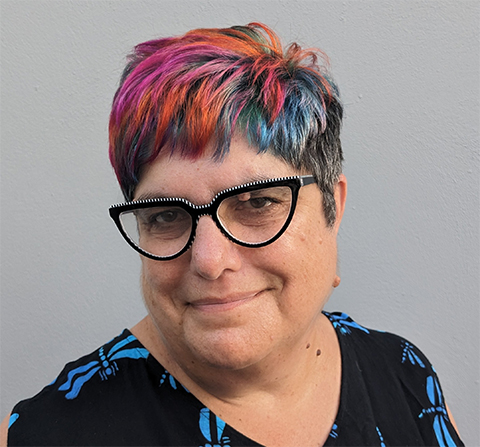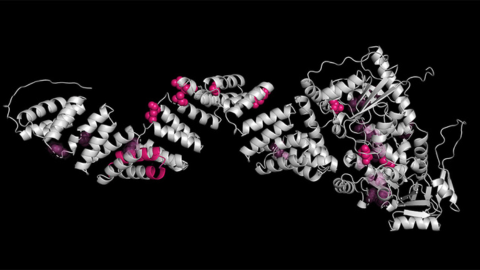Embracing serendipity
Dorit Zuk says she joined the ASBMB’s Education and Professional Development Committee in 2005 for two reasons: “To remind everybody that ‘BMB’ stands for molecular biology, as well as biochemistry, and to remind everybody that there's more than one career outcome and to stop using the term ‘alternative.’
“I used to stomp my feet in those meetings and say, ‘They're all careers; there's nothing alternative about any of them.’ There are many things you can do with a Ph.D. in biology. I know this because I've done most of them.”

Zuk, deputy director of the National Institute of General Medical Sciences of the National Institutes of Health since 2021, likes taking chances and embarking on new career adventures.
After finishing her Ph.D. at the Weizmann Institute of Science and a postdoc studying the messenger RNA turnover at the University of Massachusetts Chan Medical School in the laboratory of Allan Jacobson, Zuk left academia to pursue a role in publishing.
After six years at Cell Press, she thought she’d try her hand at science policy, and that field has stuck.
ASBMB Today spoke with Zuk about her dynamic career and her advice for today’s young scientists. The interview has been edited for length and clarity.
Q: How did you become NIGMS deputy director?
Zuk: First, I’d like to say I am a card-carrying molecular biologist. My training is in RNA biology and genetics. And I'm the type of person who's always wondering what's around the corner, even when I'm in a job I love.
My path was all about serendipity. But serendipity has two important segments. You have to recognize it, and then you have to act on it. During my postdoc, I was applying for academic positions and interviewed at a couple of places. I was also writing an article about RNA turnover. I needed a Molecular Cell paper, and I found that the entire journal issue was missing from PubMed, so I had to go to the Molecular Cell website to get the paper. There, I saw an ad for a molecular biology editor at Cell, which I would never have seen if I didn’t have to go to their website. So, that's the serendipity.
The part where I acted on the serendipity was that I thought, ‘Oh, I wonder what that would be like?’ I also thought, ‘I could do that job for a year, and if it's interesting, I'll stay. If it's not, I will have learned a lot, and I'll come back to academia.’ So, I applied, and two weeks later, I got the job.
I could have been happy in that job until the end of my days. But one day, the topic of the American Association for the Advancement of Science & Technology Policy Fellowship came up. I was interested so I looked it up, and it said, right at the top: not just for early-career folks. I applied, and I got a position at the National Institutes of Health in the Office of Extramural Research and the Office of Director. I really enjoyed that.
I did a short stint at the American Academy of Arts and Sciences, and then I went back to NIH. I’ve been here ever since. I was a division director at NIGMS for six years before I became the deputy director, so, I know the institute, its values and how it runs. I have spent a lot of time on the policy and communications sides of NIH, so I bring my knowledge in policy, outreach and legislative affairs to the position as well.
Q: What is your role as deputy director? What does your day-to-day look like?
Zuk: As deputy director, I think about the institute as a whole. I work with Jon Lorsch, the director of NIGMS, to implement the institute’s missions and values.
On a day-to-day basis, I talk to a lot of different people. This is so I can keep up with what is happening around the institute, make sure that we're on track and look for ways to improve operations.
I'm involved with NIH-wide activities as well. I try to make sure that I bring the NIGMS perspective to the table and ensure that our values and our interests are represented.
Q: What are your favorite and least favorite parts of your job?
Zuk: I've always liked thinking broadly. My favorite part of my job is being able to think about the whole institute and about the entire biomedical research enterprise. I always say, ‘We do more or less the same things as academics: We write emails and documents; we go to meetings. The main difference is what we are thinking about every week.’ Sometimes having lots and lots of meetings can be tiring. But I really do like talking to people.
Q: How is scientific leadership in government different from academia or publishing?
Zuk: I think the biggest difference is the level at which we think about things. When you're in academia, at the bench, you're digging deep into something really small. It's part of a whole, but you have to go really deep.
As soon as I switched to publishing and then to policy and programming, I had to start thinking more broadly. You have to be able to see how things fit together. You can't worry about whether the experiment was done well or not. You have to think about, ‘What question was asked, and do the experiments proposed or done answer those questions?’
I think this is true about any career. As soon as you step away from the bench, even if you stay in academia or go to industry, you have to start thinking more broadly. But I think there are a lot of similarities between the fields. You work with people, and you have to get along with them.
Every single place of work, whether it is a company or academia or government, has its own rules. You have to learn those rules and operate within them.
Q: What advice would you give young scientists interested in a government career?
Zuk: Fellowships are really useful. Most of them pay a decent salary, and the goal of the fellowship is to learn and contribute to the organization at the same time. There's the AAAS fellowship; the Presidential Management Fellows Program, which is not just for scientists; the National Academy of Sciences six-week Science Policy Fellowship; and the National Human Genome Research Institute Genetics and Public Policy Fellowship. Some states also have fellowships, so you don’t have to come to Washington, D.C., if you want a career in policy.
Another suggestion is: talk to people. Most people, if you send them an email saying you are interested in what they do, will be happy to talk with you. So, look around for what you think you might be interested in doing, find someone doing it and contact them.
A piece of advice that I always give people is that you have to know yourself. You have to know if you're the type of person who needs to envision a career mapped out. If so, you probably wouldn't be able to have a career path like mine. But, if you're the type of person who wants to always learn new things, you can. Throughout my career, I always thought I could take a chance, and I would always learn something from it. You can always go back to a job you love if you aren’t happy with what you are doing.
Also, remember that your next job is likely not your last job. You want to do your best to find the right career fit, but it's not the only thing you’ll ever do. Looking back at my career at this stage, it really looks like it all made sense. It looks like there was a trajectory. But that's only in hindsight. I never envisioned it.
I certainly did not imagine that I would end up working for the U.S. government when I came to the U.S. (from Israel) for my postdoc 30 years ago. I made my choices one by one, according to what looked interesting at the time. Every time I made a choice, I accumulated more skills that all culminated in what I'm doing right now.
I don't want people to think the only way to get to a place like mine is by planning it all out. My way was not planned. This is just how I did it, but there are so many ways to end up here.
Enjoy reading ASBMB Today?
Become a member to receive the print edition four times a year and the digital edition monthly.
Learn moreFeatured jobs
from the ASBMB career center
Get the latest from ASBMB Today
Enter your email address, and we’ll send you a weekly email with recent articles, interviews and more.
Latest in Careers
Careers highlights or most popular articles

Upcoming opportunities
Friendly reminder: May 12 is the early registration and oral abstract deadline for ASBMB's meeting on O-GlcNAcylation in health and disease.

Sketching, scribbling and scicomm
Graduate student Ari Paiz describes how her love of science and art blend to make her an effective science communicator.

Embrace your neurodivergence and flourish in college
This guide offers practical advice on setting yourself up for success — learn how to leverage campus resources, work with professors and embrace your strengths.

Upcoming opportunities
Apply for the ASBMB Interactive Mentoring Activities for Grantsmanship Enhancement grant writing workshop by April 15.

Quieting the static: Building inclusive STEM classrooms
Christin Monroe, an assistant professor of chemistry at Landmark College, offers practical tips to help educators make their classrooms more accessible to neurodivergent scientists.

Unraveling oncogenesis: What makes cancer tick?
Learn about the ASBMB 2025 symposium on oncogenic hubs: chromatin regulatory and transcriptional complexes in cancer.

